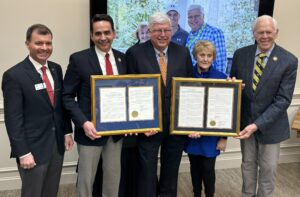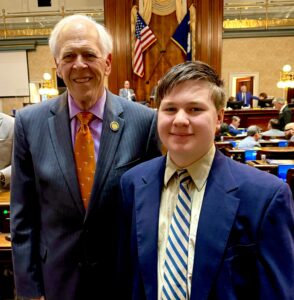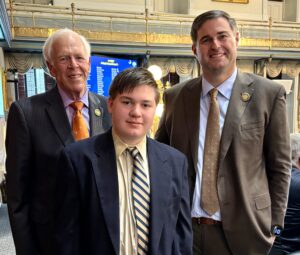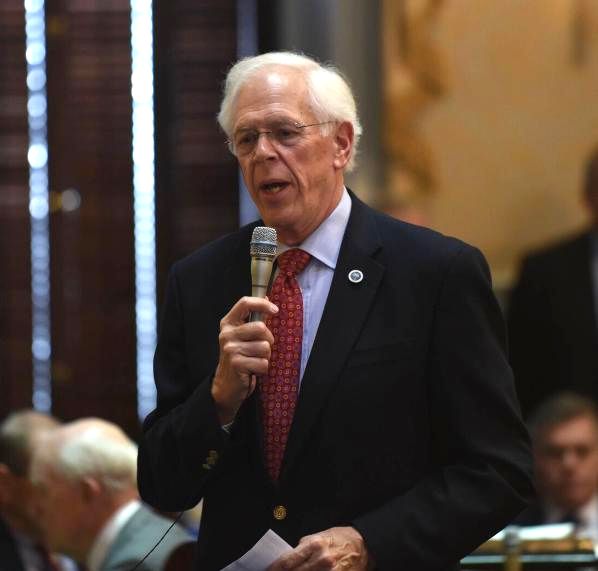Dear Friends:
Buckle up! Today’s ‘newsy update’ will speed drive you through a mound of legislative news as the South Carolina General Assembly hits 5th gear and eyes the finish line in the final months of its two-year session.
Taking Aim on ‘Corruption Hill’
 If Washington won’t curb spending and fix itself, it’s up to the States to be their ‘parent.’ The SC House voted by a 2-1 margin to join a Convention of States to propose an Amendment to the US Constitution to force the federal government to live within its means, stop borrowing from our enemies, and not spend America into bankruptcy. (Balanced Budget Resolution) I believe our nation’s Founders would be proud that we are using the Article V safety valve they placed in the Constitution. They intended it to be used for a time like this.
If Washington won’t curb spending and fix itself, it’s up to the States to be their ‘parent.’ The SC House voted by a 2-1 margin to join a Convention of States to propose an Amendment to the US Constitution to force the federal government to live within its means, stop borrowing from our enemies, and not spend America into bankruptcy. (Balanced Budget Resolution) I believe our nation’s Founders would be proud that we are using the Article V safety valve they placed in the Constitution. They intended it to be used for a time like this.
Washington DC Update: Simultaneously, Congressional leaders reached another stopgap deal that avoided a government shutdown for a week because they repeatedly failed to create a budget to fund the government — all the while the DEBT CLOCK rapidly increases. We’re nearing $34.5 trillion in national debt. In 2001, our debt was $5.8 trillion.
Pushback: You may recall that with great fanfare, SC passed the more expansive Article V Convention of States legislation in 2022. I championed that initiative for nine years, making SC the 19th state to vote to convene an amending convention to propose limits on the federal government in three areas: fiscal restraints, limit its powers and jurisdiction, and impose term limits. Success would put the ever-expanding federal government back in its Constitutional box designed by our Founders.
State Government Restructuring
 Last year, the legislature split the behemoth Department of Health & Environment Control (DHEC) into two separate entities: one focusing on environmental issues, the other on health.
Last year, the legislature split the behemoth Department of Health & Environment Control (DHEC) into two separate entities: one focusing on environmental issues, the other on health.
This week, the House voted overwhelmingly to restructure the health and human services division. Our debate follows a year-long study by independent experts who reported that SC had the most fragmented health delivery service system of any state. This legislation (H.4927) consolidates and streamlines state health agencies, similar to Florida and Utah, which are now in the top 5% of states in providing health services.
Six independent state agencies would be brought together under one administrative umbrella:
- Department of Health and Human Services
- Department of Public Health
- Department on Aging
- Department of Disabilities and Special Needs
- Department of Mental Health
- Department of Alcohol and Other Drug Abuse Services
Health Policy: This legislation does not change current health policy. It is solely about organizational policy and streamlining administrative functions, communications, and coordination between the current agencies. But most importantly, it brings accountability so South Carolinians can get much-improved health services and avoid being ping-ponged between state agencies and not getting the help they need.
The Health Czar Nonsense: Social media went into whacky overdrive this week when sensationalists stirred the political pot, claiming the bill creates a SC Health Czar, more powerful than the infamous Anthony Fauci. They made ludicrous claims that the Secretary of the Executive Office of Health Policy could single-handedly declare a health emergency and shut down the state or require vaccines or face masks. They didn’t know that DHEC’s seven-member appointed board currently has those powers.
the political pot, claiming the bill creates a SC Health Czar, more powerful than the infamous Anthony Fauci. They made ludicrous claims that the Secretary of the Executive Office of Health Policy could single-handedly declare a health emergency and shut down the state or require vaccines or face masks. They didn’t know that DHEC’s seven-member appointed board currently has those powers.
Real Accountability: This bill brings accountability for major health decisions to the Governor. Like every cabinet official, the Health Secretary is nominated by the Governor with the consent of the Senate. Unlike the current DHEC board, the Governor can fire the Health Secretary, with or without cause. Performance accountability ultimately rests with the Governor, a statewide elected official.
The Health Secretary’s chief task is to align the separate health agencies and prioritize and streamline services to be more efficient, so they provide excellent service to citizens. Last week, the Senate passed its version of the bill (S.915) while the House bill heads to the Senate for their consideration.
Keeping Your Lights On
Two things go together: SC is booming, and SC is at risk of running out of energy.
A House legislative subcommittee began discussions on a sweeping energy reform bill allowing utilities to speed up projects to avoid a looming energy crisis facing our rapidly growing state.
A significant point of contention is converting a shuttered Lowcountry coal-fired power plant to natural gas. Not surprisingly, environmentalists are opposed.
Sponsored by House Speaker Murrell Smith, the 10-Year Energy Transformation Act aims to have the state’s energy generation incorporate an “all of the above” approach that includes wind, solar, and nuclear energy alongside more traditional sources like natural gas. The bill proposes a dramatic and immediate emphasis on natural gas, essential to meet the state’s emergent energy needs.
The bill (H.5118), which has 60 sponsors, would loosen regulations on SC’s utility industries, allowing them to expedite projects that historically would have been mired in years of environmental review and litigation.
LEGISLATIVE SPOTLIGHT
Protecting Farmers
Last month, Gov. McMaster signed my ESG Pension Protection Act into law. Moments after that bill signing, several of us met and agreed to craft the FARMERS PROTECTION ACT (H.5169). The bill was introduced Wednesday with 47 sponsors, including Speaker Murrell Smith and Majority Leader Davey Hiott.
 The bill is intended to protect SC farmers from being victimized by WOKE initiatives that could shut them down. We also must protect consumers who suffer from even higher food prices if more farmers are forced out of business.
The bill is intended to protect SC farmers from being victimized by WOKE initiatives that could shut them down. We also must protect consumers who suffer from even higher food prices if more farmers are forced out of business.
America’s biggest banks have agreed to set emissions targets for their agricultural customers by 2024, meaning that farmers will soon be under enormous pressure to reduce their emissions or risk being frozen out of bank financing.
This legislation would prohibit banks or other financial institutions from restricting services to farmers based on environmental policies and empower the agriculture commissioner and attorney general to investigate and penalize violations.
While the number of US farms continues to decline, small-scale farm operators, which comprise 89% of US farmers, now rely on off-farm employment for most of their income. Meanwhile, environmental activists have made clear that agriculture emissions targets for food-and-beverage companies “must cover scope 3 emissions,” which are emissions from suppliers, or in other words, farmers. Food and beverage companies that set these targets must force farmers to measure, report, and reduce their emissions, which will likely put small, struggling farmers out of business for good.
farmers, now rely on off-farm employment for most of their income. Meanwhile, environmental activists have made clear that agriculture emissions targets for food-and-beverage companies “must cover scope 3 emissions,” which are emissions from suppliers, or in other words, farmers. Food and beverage companies that set these targets must force farmers to measure, report, and reduce their emissions, which will likely put small, struggling farmers out of business for good.
ESG activists acknowledge that food security may be a “tradeoff” for emissions mitigation. Decreased food production and corresponding increases in food prices invariably impact the poorest people.
Many SC farmers depend on the availability of financing, and consumers rely on farmers for food. Reducing financing, restricting fertilizer usage, or forcing farmers to purchase electric farm machinery may put farmers out of business and raise consumer food prices.
This legislation takes the necessary steps to ensure that finance companies do not unfairly discriminate against agriculture producers.
LEGISLATIVE BRIEFS
 School Choice: SC is continuing on the road toward educational freedom. The next step is UNIVERSAL school choice. This week, legislation (H.5164) was filed to expand SC’s Education Scholarship Account (ESA) program. ESA’s has been a tremendous win for families, both parents and students. The current three-year rollout of the Education Savings Trust Fund program imposes restrictions on eligibility, including a household income limit, a hard number of scholarship slots, and a prior public school attendance requirement. Universal school choice would sweep aside those restrictions allowing more families to seek better education for their children. Let’s be like Florida with its successful universal choice program.
School Choice: SC is continuing on the road toward educational freedom. The next step is UNIVERSAL school choice. This week, legislation (H.5164) was filed to expand SC’s Education Scholarship Account (ESA) program. ESA’s has been a tremendous win for families, both parents and students. The current three-year rollout of the Education Savings Trust Fund program imposes restrictions on eligibility, including a household income limit, a hard number of scholarship slots, and a prior public school attendance requirement. Universal school choice would sweep aside those restrictions allowing more families to seek better education for their children. Let’s be like Florida with its successful universal choice program.
Dog Collars: A bill that prohibits illegally removing a dog’s collar was advanced by the House Agriculture Committee. This bill (H.4611) seeks to make it an offense for a person to intentionally remove or destroy an electronic collar or other electronic device placed on a dog by its owner. The American Kennel Club (AKC) supports this bill, which will help lost dogs be identified and reunited with their owners. I am a sponsor of this bill.
Talking Constitutional Carry: There is hope that House and Senate conferees will find mutual ground and agree to legislation allowing state residents to carry firearms without a permit. The Constitutional Carry Act passed both the House and Senate, and now negotiators are trying to iron out differences that most Senators and Representatives could support. Stay tuned.
Judicial Reform: Judicial reform is a hot topic in this session. The House is finalizing its legislative approach to selecting judges, while the Senate has put its reform bill (S.1046) on the front burner. The Senate’s proposed legislation includes multiple changes to the composition and operation of the Judicial Merit Selection Commission and bans legislators from sitting on the panel. Given the number of legislators/lawyers, that may be a difficult sell to them.
selecting judges, while the Senate has put its reform bill (S.1046) on the front burner. The Senate’s proposed legislation includes multiple changes to the composition and operation of the Judicial Merit Selection Commission and bans legislators from sitting on the panel. Given the number of legislators/lawyers, that may be a difficult sell to them.
Read-to-Succeed: Our kids must learn to read! This week, the legislature beefed up our existing ‘Read-to-Succeed’ program to ensure classrooms implement scientifically based reading instruction. The House voted unanimously to agree with Senate amendments to the bill (S.418), which combines formative assessments, reducing the overall number from six to three. Students in kindergarten through second grade who do not demonstrate reading proficiency shall be required to attend summer reading camps. We also made it easier for kindergarten through third-grade teachers to be certified in literacy at no cost. The bill heads to the Governor for his approval.
Writing Cursive: The House voted 107-1 to expand the state’s cursive instruction requirement from fifth grade down to second through fifth grade. Cursive has declined for years as an increasingly tech-savvy culture. And young people don’t see the point of the curling script when print works just fine. Many educators say that learning cursive is valuable. The pro-cursive movement is growing nationally. Since 2010, more than a dozen states have passed laws requiring cursive instruction.
IVR Legislation: A bipartisan group of state legislators filed a bill this week that would enshrine protections for in vitro fertilization in state law following the decision by the Alabama Supreme Court that frozen embryos have the same legal rights as children. The bill (H.5157) would mandate any fertilized human egg or human embryo outside the uterus could not be legally considered a child. Other legislators contend that action isn’t necessary as the legal landscape in SC is different, and there is no threat to IVF here.
Trafficking Migrant Children: SC Attorney General Alan Wilson has joined a coalition of attorneys general from 22 states demanding that federal officials address a recent report that found unaccompanied migrant children in the custody of the federal government are being released into unsafe situations, including into human trafficking. According to Wilson, “This is yet another tragic example of how out-of-control our southern border is. Human trafficking is horrible, and trafficking of children is even far more horrendous.”
Budget Nugget: SC homeowners may see a reduced property tax bill later this year under a House budget proposal. In the initial budget, writers want to distribute $500 million in saved sales tax revenue that has accumulated since 2020. The $500 million would go to counties based on population, and counties would then credit money to property taxpayers. It’s estimated that the one-time property tax credit would range from $277 to $472.
House District 86 News
 Thursday, we honored Aiken Chamber President David Jameson on his retirement. Many community leaders look on as Sen. Tom Young, Rep. Bart Blackwell, and I presented David with Senate and House Resolutions, recognizing his 50-year career and many accomplishments. David’s trademark phrase is, “If you’re lucky enough to live in Aiken, you’re lucky enough.” Aiken was lucky enough to benefit from David’s leadership for 18 years.
Thursday, we honored Aiken Chamber President David Jameson on his retirement. Many community leaders look on as Sen. Tom Young, Rep. Bart Blackwell, and I presented David with Senate and House Resolutions, recognizing his 50-year career and many accomplishments. David’s trademark phrase is, “If you’re lucky enough to live in Aiken, you’re lucky enough.” Aiken was lucky enough to benefit from David’s leadership for 18 years.
PICTURES OF THE WEEK
 It was my honor this week to host Whit Eubanks, a 9th grader from
It was my honor this week to host Whit Eubanks, a 9th grader from South Aiken Baptist School, as my student shadow. Whit got the opportunity to witness the legislative process up close as we debated restructuring the state government’s health agencies. He was also welcomed by Speaker of the House Murrell Smith.
South Aiken Baptist School, as my student shadow. Whit got the opportunity to witness the legislative process up close as we debated restructuring the state government’s health agencies. He was also welcomed by Speaker of the House Murrell Smith.
Want to Know More?
Do you want to learn more about my positions, bill sponsorships, voting record, and past writings? Here are some handy links:
- About Me: https://taylorschouse.com/about-2/
- My Positions: https://taylorschouse.com/issues/
- Sponsored Bill & Voting Record: http://tiny.cc/b1pouz
- Recent Newsletters: https://taylorschouse.com/category/newsletter/
I’m Available & AT YOUR SERVICE

It is my honor to be of service. Please do not hesitate to contact me if you need assistance navigating state government or have any thoughts or concerns about the legislature.
In Your Service,

Email: Bill@taylorschouse.com
www.TaylorSCHouse.com
Newsletter not paid using taxpayer funds.
Legal Notice: This newsletter is not a solicitation for contributions to any SC registered lobbyist.

